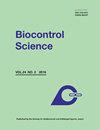紫外线照射对面包厂青霉菌的影响及其在烘焙产品中的应用。
IF 1.1
4区 农林科学
Q4 BIOTECHNOLOGY & APPLIED MICROBIOLOGY
引用次数: 5
摘要
试验了紫外辐照处理对面包霉菌生长的控制作用。首先,我们分析了约25 mJ/cm2辐射剂量对从面包生产厂分离的9株青霉和2株塔拉芳香菌的灭菌效果。该剂量对P. chermesinum和P. paneum菌株完全灭菌,而对P. corylophilum仅部分有效。在约120 mJ/cm2的剂量下,对P. chrysogenum和P. decumbens进行灭菌,而对T. amestolkiae进行灭菌,灭菌剂量约为150 mJ/cm2。对盲肠弧菌和西班牙芽孢杆菌的灭菌需要200 mJ/cm2以上的辐射。这些结果表明,紫外光抗性因品种和品系的不同而不同。我们还对面包进行了70兆焦耳/平方厘米的紫外线照射:在这个剂量下,面包的味道不会受到影响;我们观察到,与未辐照的面包相比,霉菌生长明显延迟。这些结果表明,70 mJ/cm2的紫外线照射可有效延缓霉菌生长,但不能完全杀菌。这种方法对于延长面包的保质期应该是有用的。本文章由计算机程序翻译,如有差异,请以英文原文为准。
Effects of UV Irradiation on Penicillium Strains Isolated from a Bread Plant and the Application to Bakery Products.
We tested treatement with UV irradiation for controlling the growth of bread mold. First, we analyzed the sterilizing effect of a dose of approximately 25 mJ/cm2 radiation on nine Penicillium and two Talaromyces strains that were isolated from a bread-manufacturing plant. The P. chermesinum and P. paneum strains were sterilized completely at that dose, while it was only partially effective against P. corylophilum. P. chrysogenum and P. decumbens were sterilized at a dose of approximately 120 mJ/cm2, while T. amestolkiae was sterilized at approximately 150 mJ/cm2. Sterilization of T. cecidicola and P. hispanicum required more than 200 mJ/cm2 of radiation. These results suggest that UV resistance varies depending on the species and the strains. We also carried out UV irradiation of bread at 70 mJ/cm2: a dose at which the taste of bread is not affected; we observed that mold growth was delayed visibly compared to the non-irradiated bread. These results suggest that UV irradiation at 70 mJ/cm2 is effective at delaying mold growth, though it does not cause complete sterilization. This method should prove useful for extending the shelf-life of bread.
求助全文
通过发布文献求助,成功后即可免费获取论文全文。
去求助
来源期刊

Biocontrol science
BIOTECHNOLOGY & APPLIED MICROBIOLOGY-
CiteScore
2.60
自引率
8.30%
发文量
21
审稿时长
>12 weeks
期刊介绍:
The Biocontrol Science provides a medium for the publication of original articles, concise notes, and review articles on all aspects of science and technology of biocontrol.
 求助内容:
求助内容: 应助结果提醒方式:
应助结果提醒方式:


